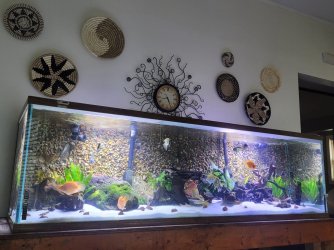What is the GH (general hardness), KH (carbonate hardness) and pH of your water supply?
This information can usually be obtained from your water supply company's website (Water Analysis Report) or by telephoning them. If they can't help you, take a glass full of tap water to the local pet shop and get them to test it for you. Write the results down (in numbers) when they do the tests. And ask them what the results are in (eg: ppm, dGH, or something else).
Depending on what the GH of your water is, will determine what fish you should keep.
Angelfish, discus, most tetras, most barbs, Bettas, gouramis, rasbora, Corydoras and small species of suckermouth catfish all occur in soft water (GH below 100ppm) and a pH below 7.0.
Livebearers (guppies, platies, swordtails, mollies), rainbowfish and goldfish occur in medium hard water with a GH around 200-250ppm and a pH above 7.0.
If you have very hard water (GH above 300ppm) then look at African Rift Lake cichlids, or use distilled or reverse osmosis water to reduce the GH and keep fishes from softer water.
--------------------
You have an angelfish in the tank and that will get bashed by the blood parrots and discus when they are older.
Your roseline barbs? need to be in groups of 10 or more.
You have peacock cichlids (Aulonocara sp) in the tank and these are from Lake Malawi in Africa. They need a pH above 7.6 and a GH above 300ppm. Discus and angelfish will not tolerate hard water and die prematurely in hard water.
There's a couple of fish slightly to the right of center, but up near the top of the tank and they look stressed.
You have what appears to be a tetra on the far right. All tetras need to be in groups of at least 10 of their own kind and more is better. Most tetras don't get that big and any small narrow fish will be eaten by adult Aulonocara cichlids, which naturally prey on small fish.
The discus need plant matter in their diet. You can feed them on various marine and freshwater algae and aquarium plants, as well as offering various plant based fish foods and things like cucumber, zucchini, pumpkin, etc.
Do not feed them onions or onion relative, and no potatoes.
Make sure any fruit or veges are free of chemicals and washed well under tap water before being put in the tank. remove uneaten plant foods after an hour.
More info on the discus diet can be found at the following link.
Dec 22, 2008 - of the lake hosting more than a thousand discus. Only 16 of the 41 ..... ing free-swimming B. cichlae wit...

moam.info





 but I'll keep an eye on it. We do plan to leave the blue acara in this tank with the discus as they have been very peaceful for months that we have had them.
but I'll keep an eye on it. We do plan to leave the blue acara in this tank with the discus as they have been very peaceful for months that we have had them.